- About Us
- Columns
- Letters
- Cartoons
- The Udder Limits
- Archives
- Ezy Reading Archive
- 2024 Cud Archives
- 2023 Cud Archives
- 2022 Cud Archives
- 2021 Cud Archives
- 2020 Cud Archives
- 2015-2019
- 2010-2014
- 2004-2009
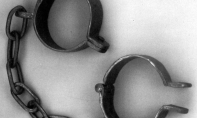 |
The ‘Preliminary Proclamation’ |
When one hears the term "slave" in the west, the notion — a caricature, essentially — of a dark-skinned African comes to mind. Doubtless, as well, is the belief that 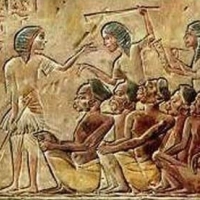 chattel-servitude served as a general rule for the entire civilized world. Slavery in contemporary identity politics is relevant, even over 140 years later.
chattel-servitude served as a general rule for the entire civilized world. Slavery in contemporary identity politics is relevant, even over 140 years later.
In antiquity, the pale-skin of the average slave traded around the Mediterranean basin was no cause for outrage. "Slave" denotes people such as Russians, Poles, Czechs and Croats in a host of languages. The etymology of "eunuch" (a castrated slave) is the same, in fact. Notably Persia, Greece, Rome, Islamic Turkey and Egypt made great use of slaves. Of the former classical civilizations, what blacks they were to encounter were more often than not merchants and mercenaries: "Among many Mediterraneans, the first and continuing image of blacks was that of a respected ally or an enemy," noted the classicist Frank Snowden, "often a formidable one." In the 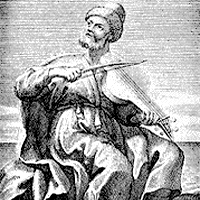 Islamic Middle Ages, the life expectancy of the average Zanj (black slave) was poor. Especially for those summoned to castration, shipped off to the bustling ports of the trans-continental Islamic empire, the perilous trip and the expectation of dying young, performing the most menial tasks, had to evoke a deterrent of some sort.
Islamic Middle Ages, the life expectancy of the average Zanj (black slave) was poor. Especially for those summoned to castration, shipped off to the bustling ports of the trans-continental Islamic empire, the perilous trip and the expectation of dying young, performing the most menial tasks, had to evoke a deterrent of some sort.
From the ninth to thirteenth centuries Circassian slaves and captured soldiers from the region of the Caucasus, first drafted into the elite-guard of the Abassid caliphate at Baghdad, would amass influence in the "Orient". In Egypt, for example, the Mamluk Sultanate ruled its affairs from the twelfth century until the arrival of Napoleon. The Zanj distinguished themselves as fighting men in the Zanj Revolt of the ninth century, going on to rule Baghdad and Basra for over a decade; restoring their ancient worth as mercenaries, revolting forty times over the course of the early Middle Ages. However little is said of black slaves in the record outside of their participation in the crusades, until the fifteenth century. The military feats 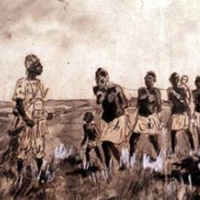 of slave-soldiers throughout human history are voluminous. These military feats were so prolific that even some scholars lose sight of their additional contributions to the arts and sciences.
of slave-soldiers throughout human history are voluminous. These military feats were so prolific that even some scholars lose sight of their additional contributions to the arts and sciences.
Perhaps the greatest example in this respect is Ziryab of Baghdad, an emigre-Zanj in medieval Spain. His contributions to the West in terms of decorum, chemistry, botany and musicology, especially in his reinvention of the lute, make him extraordinarily historically important. Malik Ambar, the Habeshi (Ethiopian) that founded the city Aurangabad in southwest India, frustrating the Mughals, was a slave "but an able man. In warfare, in command, in sound judgment, in administration, he had no rival or equal," wrote one contemporary historian. Like the Mamluks, the Kizlar Agasi (black eunuchs) of Turkey were exceptional administrators. 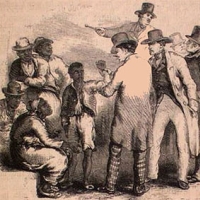 It so happens, even in our examples of slavery, those in service of the well-to-do class often possessed unique liberties: trust over heirs; preferred over wives. The "swarming mulattoes and quadroons and octoroons who possess this region and call themselves Americans," wrote a union officer of what he saw in late nineteenth century Louisiana, "some of the richest planters, men of really great wealth, are of mixed descent," for, "these are not the former slaves, observe, but the former masters".
It so happens, even in our examples of slavery, those in service of the well-to-do class often possessed unique liberties: trust over heirs; preferred over wives. The "swarming mulattoes and quadroons and octoroons who possess this region and call themselves Americans," wrote a union officer of what he saw in late nineteenth century Louisiana, "some of the richest planters, men of really great wealth, are of mixed descent," for, "these are not the former slaves, observe, but the former masters".
Twenty-first century legislators in Alabama, Maryland, North Carolina, New Jersey, Virginia and Florida have proposed or passed resolutions 'apologizing' for slavery. Nebraska, amending their resolution out of jurisprudence, removed the apologetic language and condemned "racial discrimination in any form toward African-Americans," punctuating the object of this piece — the equivocation of "black" with "slave". That smart black people have  praised these resolutions is troubling, though not as troubling as our collective historical illiteracy. In 1654 a man by the name of Anthony Johnson, determined to reclaim one of his slaves, famously sued a white man in a seventeenth century Virginia court –Johnson was a black man, and incidentally became the first legally recognized slaveholder in modern American history. The manumission of reason is how the fundamentals of this "peculiar institution" get lost in caricature. Constructs like political correct/incorrectness are seeping into the texture of our modern laws as those of sheer xenophobia did for the previous course of 240 years. Allowing this to fester, as harmless as it may seem, is a malady we can ill afford.
praised these resolutions is troubling, though not as troubling as our collective historical illiteracy. In 1654 a man by the name of Anthony Johnson, determined to reclaim one of his slaves, famously sued a white man in a seventeenth century Virginia court –Johnson was a black man, and incidentally became the first legally recognized slaveholder in modern American history. The manumission of reason is how the fundamentals of this "peculiar institution" get lost in caricature. Constructs like political correct/incorrectness are seeping into the texture of our modern laws as those of sheer xenophobia did for the previous course of 240 years. Allowing this to fester, as harmless as it may seem, is a malady we can ill afford.
